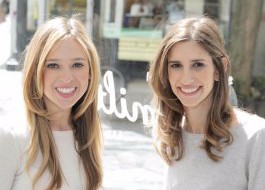 Jessica Lachs (far right) and other DoorDash staffers DoorDash
Jessica Lachs (far right) and other DoorDash staffers DoorDash
Jessica Lachs lived the Wall Street banker life for years, including stints in Hong Kong and London working for Lehman Brothers.
Then the 2008 financial crisis struck and Lehman Brothers collapsed.
Lachs left Wall Street to get an MBA, hoping that some magical moment would strike where she would know what else to do with her life.
"I thought that I’d be sitting in a class and just have this moment of inspiration and I’d be like 'This is it! This is my passion! This is what I want to do!'" Lachs told Business Insider. "That absolutely didn’t happen."
That moment of clarity didn't happen in that instant, but it would several years later when Lachs realized the spreadsheets she'd been using as a general manager of a food-delivery startup were just the tip of the data that the startup could be using to fine-tune its business.
To dig deeper, Lachs taught herself how to code and learning just one programming language to start set her on the path to running one of the most important departments at DoorDash, a $700 million food delivery startup that's challenging the likes of GrubHub and UberEats.
Taking a gamble
Lachs tends to be risk-averse, so giving up her Wall Street career on the gamble that she'd find something she'd love in business school was "really scary," she says now looking back. Lachs enrolled at The Wharton School at the University of Pennsylvania and took a variety of classes trying to find her niche in the business world.
“It’s really easy to tell the story and say 'Oh, I went to business school to figure out what I wanted to do.' But to actually live through that and not know what I wanted to do and not know where I was going to be was a pretty scary thing," Lachs said.
A basic computer science class never held her attention, but a class in entrepreneurship started to change her perspective on what it meant to be in business.
 GiftSimple
GiftSimple
"The class made me realize entrepreneurs don’t always look like what, in my mind, they look like," Lachs said. "In my mind, they’re these incredibly charismatic, white male, visionary — basically the opposite of me."
As part of her class, she started a business called Gift Simple where multiple friends or family could contribute to an expensive gift like an iPad or expensive TV. She stuck with the business after graduation, but before long she had to don her banker hat again and took a hard look at her business' numbers.
"While it was a nice small business, it was never going to be a DoorDash," Lachs said. "That’s when I decided to do something else."
Joining the startup world
It was another risk, but this time Lachs worked her way to finding her true passion: data.
Through the New York startup scene, she got an introduction to Sequoia Capital, a venture firm that introduced her to Tony Xu. The former Stanford grad had launched a food delivery startup in Palo Alto and needed a general manager to help launch in new cities.
 DoorDash
DoorDash
Joining a tech startup as a woman didn't give Lachs pause, despite the industry's notoriety towards treatment of women. Even the most valuable private tech startup, Uber, is currently undergoing an investigation into allegations of sexual harassment in the workplace.
"To be honest, the thought didn’t really cross my mind when joining tech. It was just that it was going to be a lot like banking," Lachs said. "The fact that I’m a woman here is sort of a non-issue."
She joined DoorDash in June 2014 when the startup only had 20 to 30 people and helped build it from there. At first, it was a do-everything-that-was-necessary gig, whether it was going out to sell new restaurants or orienting new drivers (called Dashers) to the system — "even taking out the garbage every Saturday night," Lachs said.
But the more DoorDash launched new markets, more questions would come up. Boston didn't work the same as Palo Alto, and Los Angeles was on a different growth trajectory than San Jose. There were a lot of questions that the company wanted answered, but no one in place to be that go-to person.
"Maybe I’m a know-it-all, but I love having the answers to things. And in order to get these answers, you really have to dig into the data," Lachs said. "That became my role, to be the sort of Q&A center for DoorDash."
Two weeks of the basics
Lachs' background in banking meant she could do the job well enough by just working on her Excel spreadsheets. But that quickly became a limitation. DoorDash had tons of data it was collecting on its business, from how much couriers were making on each order to which items were the most popular on weekends, but it was up to Lachs to start processing it.
Determined to learn how to code, she spent two weeks learning the basics of SQL, a basic programming language for working in databases to pull and extract information. Lachs largely learned through all of the free online classes available and leaned on her co-workers that had experience to help her through the tricky spots.
"A two-week investment and you can be a beginner and pull some basic data," Lachs said. "I think where people get stuck is that basic SQL doesn’t get you very far in the real world because data sets are never as neat and clean as the ones that are in the tutorial. And making that jump is much trickier."

It took Lachs another month or two to learn enough that she could solve about 80% of the questions asked of her. One of the first challenges they tackled was learning how much a Dasher needs to make in different markets in order to keep them working for DoorDash and not desert to another competitor.
I'm a testament to the fact that you really can teach yourself a lot now.These days, Lachs team has expanded from just her to now 8 people and she's now officially the Head of Business Operations and Analytics for the company. By the end of 2017, she hopes to have doubled the number of people on her team.
In addition to its works on the hard problems, like shaping a market, Lachs' team also works on fun stuff. The company's PR team loves to make crazy requests like what foods are spiking during the presidential debates in red vs blue states, or random trivia like how many menu items on DoorDash say "Earth" for Earth Day.
“That contributes to morale more than the bottom line, but it just goes to show you how diverse a data role can be from some of the light-hearted stuff to something more serious,” Lachs said.
Just because her team has found success in building the food delivery startup into the $700 million company it is today doesn't mean Lachs has stopped trying to learn. To this day, Lach keeps a bookmark folder on her computer called "Learning" with links to more courses and tutorials she wants to take. But now, she's one of the leaders at DoorDash who is teaching a new wave of employees how to analyze data beyond an Excel spreadsheet and become empowered as a result.
“I’m a testament to the fact that you really can teach yourself a lot now," Lachs said. "There are a ton of great resources out there if you want to learn something, between free online resources, the videos, and just the people that you surround yourself with — you can learn pretty much everything.”




